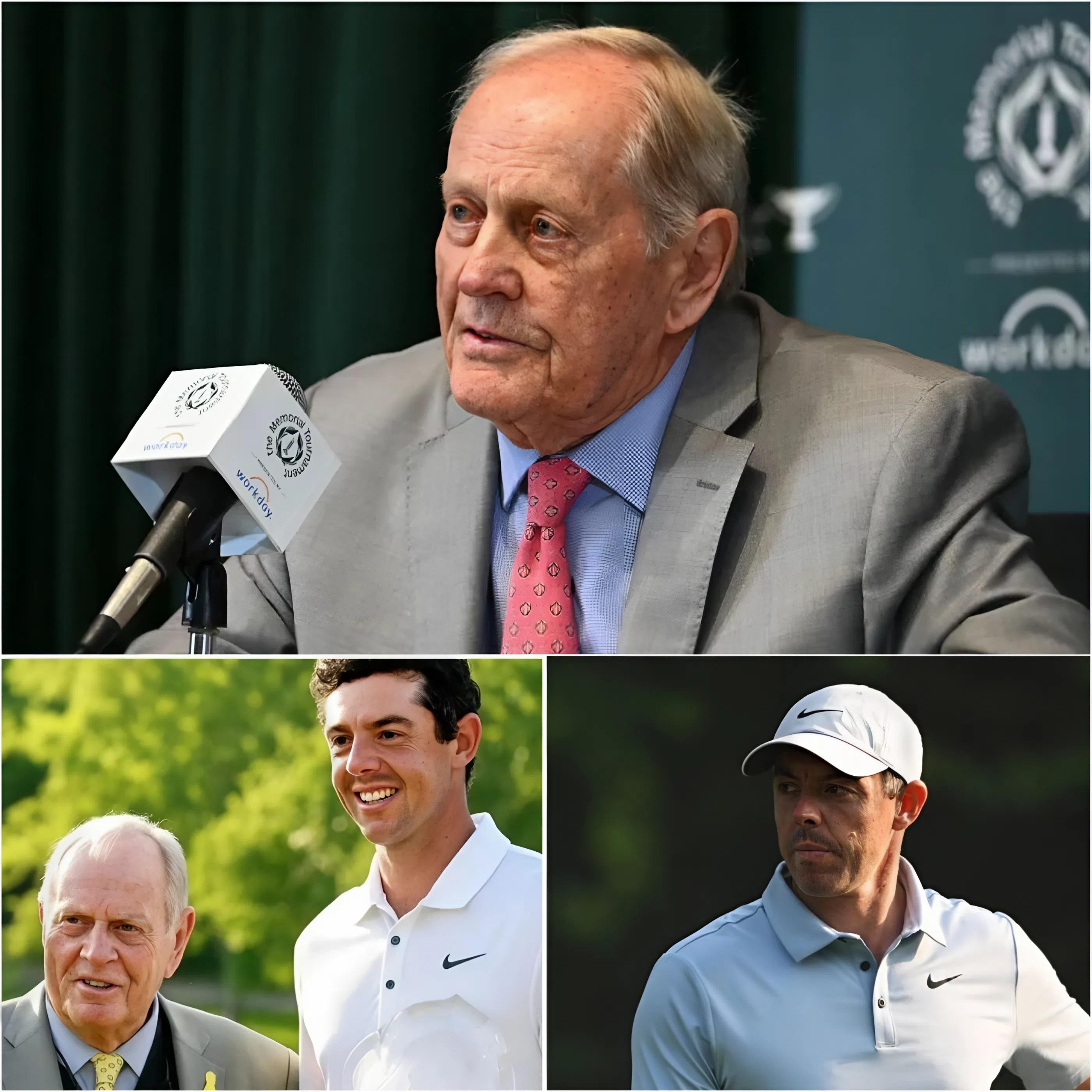The golf world has erupted into chaos after legendary figure Jack Nicklaus broke his silence regarding Rory McIlroy’s recent struggles. His shocking statement, filled with passion and frustration, has ignited one of the most intense debates in modern golf history.

Nicklaus, often regarded as the greatest golfer of all time, did not mince words. Speaking during a private charity event in Florida, he reportedly said: “What is happening to Rory McIlroy is a crime against golf.” The audience was left in stunned silence.
The 18-time major champion went further, calling McIlroy “the pride of America” — despite the Northern Irishman representing Europe in international competition. His statement has since sparked confusion, controversy, and countless interpretations across social media platforms.
Nicklaus appeared visibly emotional as he continued: “How can anyone be so cruel as to abandon a 36-year-old man carrying the pride of a nation on his shoulders?” The words struck a chord with fans who believe McIlroy has been unfairly treated by the media and golf institutions.
Moments later, Nicklaus added a cryptic 12-word warning that set the golf community ablaze: “When you destroy a champion’s spirit, you destroy the soul of the game.” Those words have since been shared millions of times online, fueling speculation about what — or who — he was referring to.
Within hours, major sports outlets and fan forums were flooded with reactions. Some praised Nicklaus for standing up for a player who has endured relentless scrutiny; others criticized him for dramatizing McIlroy’s recent setbacks as something “criminal” or exaggerated.
Rory McIlroy’s recent months have been turbulent. Once the golden boy of golf, he has faced career uncertainty, inconsistent form, and increasing pressure from both fans and sponsors. His recent decision to take a break from competition only intensified rumors about his mental and emotional state.
Golf insiders claim that McIlroy has been battling more than just swing mechanics — suggesting internal conflicts with sponsors, management changes, and even personal doubts about his legacy. In that context, Nicklaus’s words have been interpreted as both empathy and a warning to the sport’s leadership.
Nicklaus’s defense of McIlroy has also reopened discussions about how professional athletes are treated once they reach their thirties. In an era where youth dominates, veterans like McIlroy are often pressured to maintain unrealistic levels of excellence, leaving little room for human error.
Prominent golf analyst Jason Roberts commented: “Nicklaus didn’t just defend McIlroy — he reminded us that legends deserve respect, not ridicule. The media builds them up, and then tears them down the moment they show vulnerability.” His words echoed across sports talk shows worldwide.
The reaction from the golfing establishment has been mixed. Some officials privately applauded Nicklaus’s courage to speak truth to power, while others dismissed his comments as “emotional exaggeration” from a retired legend nostalgic for a different era.
Adding even more drama, McIlroy’s camp released a brief statement just hours after Nicklaus’s remarks. The message read: “Rory is grateful for the support and continues to focus on what matters — his family, his health, and his love for golf.” It was brief, dignified, and calm.

However, insiders close to McIlroy suggest that the golfer was genuinely moved by Nicklaus’s defense. “He’s been through a lot,” one source said. “Hearing those words from Jack meant the world to him. It reminded him that greatness doesn’t fade — it just evolves.”
Meanwhile, critics have accused Nicklaus of overstepping boundaries, arguing that his statements were unnecessarily dramatic. Some pointed out that McIlroy, far from being “abandoned,” remains one of the most popular and well-compensated athletes in the sport.
But even those critics admit that Nicklaus’s emotional speech struck a universal chord. His defense of McIlroy transcends golf; it touches on a broader conversation about respect, resilience, and the mental toll of fame in high-pressure environments.
Social media platforms exploded with reactions under the hashtag #NicklausVsGolfWorld, as fans debated whether the legend was right to call out the system. Some even compared the speech to Muhammad Ali’s outspoken moments in boxing — a rare intersection of sport, conscience, and rebellion.

As the discussion rages on, Nicklaus has not issued further comments, fueling speculation that his remarks were part of a broader statement about the state of professional golf. Some believe he may soon address what he perceives as growing commercialism and a loss of spirit within the sport.
For McIlroy, this moment could represent a turning point. He now finds himself supported by one of the most respected voices in golf history — a validation that could reignite his confidence and perhaps inspire a comeback in 2026.
The incident also reveals something profound about the golf community. It’s not just about trophies or swing perfection anymore; it’s about legacy, empathy, and the reminder that even legends need compassion in times of struggle.
As one fan wrote on social media: “If Jack Nicklaus says it’s a crime, then maybe we all need to rethink how we treat our heroes.” The sentiment captured the emotional tone of a day that golf fans will remember for years.
The story is still developing, and while neither McIlroy nor Nicklaus has offered additional clarification, one thing is certain: the golfing world has been shaken. A legend has spoken, and the echo of his words continues to reverberate across fairways worldwide.